The Umaru Shinkafi Legacy Foundation was established in honour of Late Umaru Aliyu Shinkafi. Amongst other humanitarian objectives, it holds an annual security summit which provides a platform for stakeholders across all spheres of National Security.
The second Shinkafi Intelligence and Security Summit held on 13th July 2021, with the Theme: Socio-Economic Implications of Kidnapping and Banditry in Nigeria.
Welcoming the participants, Chief Coordinator of the Umaru Shinkafi Legacy Foundation and former Governor of Zamfara state, H.E Mamuda Aliyu Shinkafi said that the choice of the theme and topics of discussion is apt and timely in light of the ideas of the Late Marafa. He disclosed that the discussants of the day include the Governors of some of the most hard-hit states in the country.
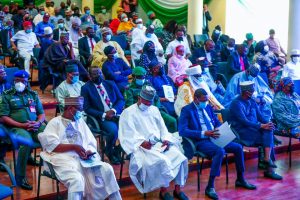

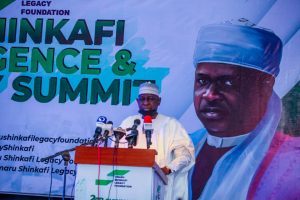
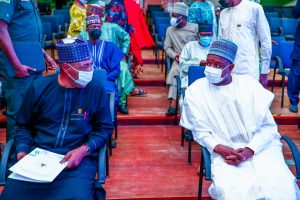
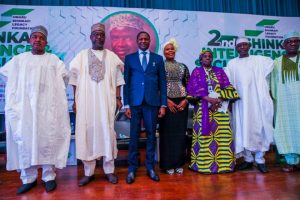
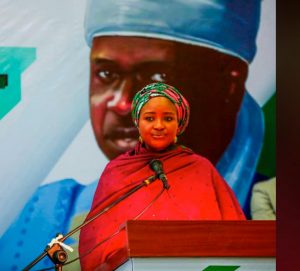
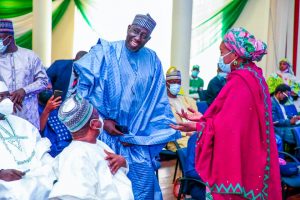
He prayed for a beneficial deliberation and announced that submissions will be forwarded to relevant authorities.
The Emir of Zazzau, HRH Amb. Ahmed Nuhu Bamalli who addressed the gathering virtually described Shinkafi as a man of impeccable character and commended the organizers of the event.
The first session had interesting discussions with the Governor of Imo state, H.E Hope Odidika Uzodinma, the Governor of Borno State, Prof Umara Zulum, The Director-General DSS, Alh Yusuf Magaji Bichi (represented), Social Activist Mr Segun Awosanya and Hajiya Zahrau Idris, a psychological specialist as the panellists.
Prof Umara Zulum hinted that lack of access to education, health care, basic amenities, and food are tools that promote insecurity. He mentioned that the inequality between elites and poor people are contributory factors that heighten insecurity.
“Access to Healthcare, access to food, and access to quality education are key to ending terrorist activities. Food insecurity is the worst form of insecurity”.
When asked by a participant on what his government is doing and to support widows in the state, H.E Zulum stated that even before he became the governor of Borno state, the administration of Kashim Shettima which he served as Commissioner, had constructed houses for the widows and established schools within the housing estate so that the children of the widows can go to school. He added that they trained them on skill acquisition as a means of livelihood for the widows so they can earn something while providing a conducive learning environment for their children.
The Governor of Imo state, H.E Hope Odidika Uzodinma called on the entire security system to reflect on how Late Umaru Shinkafi would have handled the insecurity ravaging the country.
Speaking on the intercommunal and food security threats, he averred that Shinkafi would have opted for a grassroots approach to curtail societal attitudes. He described the current situation as unfortunate saying that no investor would want to put his money in an unsafe environment.
However, the Governor noted improvements where he mentioned that Direct Foreign Investment (DFI) has tumbled over the past few months.
Hajiya Zahra’u Idris (social scientist, with expertise on family life and social issues related to women) spoke on how insecurity affects households from a family perspective. She reflected that road trips used to be fun for many reasons but this is not so anymore because no spot is safe on the road.
The fourth panellist Segun Awosanya, a human rights activist and founder of the End Sars movement, sheds light on extremism, volatility of the global market, porous borders, transnational organized crime, youth budge, nepotism and social inequality as part of the reasons we have insecurity in the country.
Segun Awosanya also suggested that communities, especially the young people, can be mobilised to respond appropriately to ongoing challenges. He proposed the establishment of a bureau for conflict resolution and peace-building in Nigeria, under the watch of the Presidency.
The second panel session engaged the Governor of Zamfara state, H.E Dr Bello Matawalle, the Governor of Niger state, H.E Abubakar Sani Bello, the Attorney General of the Federation and Minister of Justice Abubakar Malami SAN, DG NARSDA Dr Halilu Shaba, represented by Dr Rakiya, Dr Maymunah Kadiri and Barr Audu Bulama Bukarti.
On Banditry and Kidnapping, Dr Bello Matawalle said the Government of Zamfara has employed several strategies that included amnesty.
He added that initiating the Ruggah project strategy had helped to reduce clashes. The Ruggah initiative according to the Governor was a success because that was the first time in a long time the Government and Bandits organised Sharu (a local gathering which involves Fulani and community celebration).
As part of his submissions, Governor Sani Bello speaking on banditry in the Northwest region and especially in his state said the bandits are not willing to negotiate.
According to him “6000 hectares of land has been allocated where we provided food, water, and schools but banditry hasn’t stopped. Basically, we are dealing with criminals who have chosen a path of violence and criminal activities”
He called on the security agencies to revert to their beginnings and learn proper skills application.
The Governor identified traditional leaders as intelligence assets and called on people to play their roles and not leave everything in the hands of security.
He also encouraged training and vetting vigilantes to assist.
Attorney General of the Federation Abubakar Malami, spoke on nation-building within the context of law and security concerning associations for advocacy and agitations. He said that Nigerians are “creative and innovative people”, calling on citizens to mobilize their creativity positively towards nation-building.
The Hon. Minister noted that the summit provides a platform for setting an agenda for the nation within the context of law and security. He said, “association, advocacy, and agitation within the context of the law must be naturally translated to nation-building.” He believes that association and agitations like the EndSars movement, Boko Haram and IPOB cannot be condoned by the Nigerian government because it leads to loss of lives and destruction of properties.
While answering a question, AGF said, there is no regard for reconciliation with bandits.
Others on the panel spoke about partnering relevant authorities for intelligence eg NARSDA for geospatial information, the need for more coordination and a policy framework.
Dr Maymunah Kadiri drew attention to the mental health of citizens noting that we have one psychiatrist to one million Nigerians which is worrisome.
Bulama Ahmad Bukarti spoke with passion from a legal perspective and pointed out that there is no central policy coordinating security agencies in Nigeria. He challenged the state governors who are chief security officers of their states, to come out of their comfort zones and take the problem heads on.
Mary Katambi, one of the abducted Chibok girls who recently graduated from the American University of Nigeria Yola, narrated her experience on the day of the kidnap and what encouraged her to continue her study after she regained freedom. She shared that her poor background gave her the courage not to relent because continuing her studies is the surest way for her to become successful.
In his Goodwill message, The Governor of Sokoto state Rt Hon Aminu Waziri Tambuwal said that Sokoto considers Marafa as one of theirs. “This is why we are doing everything we can to immortalise him. We have renamed the state polytechnic to Umaru Ali Shinkafi Polytechnic. We have also just recently named the Senate building of the Sokoto State University after him because he is the pioneer chancellor of the University.
“Marafa is a household name for the contributions he has given to the development of Sokoto state and the country”, said Governor Tambuwal.
In his remarks, the Chief host, Senator Abubakar Atiku Bagudu, governor of Kebbi State, described the late Marafa as a man whose politics promoted the unity of the country. He said that the pervasive effect of banditry and the secessionist agitations are threatening National unity. He added that they are an indication of system decays.
Gov Bagudu submitted that “fear gives them the strength” and called on communities to support security agencies.
The governor of Yobe state, H.E Mai Mala Buni, who was represented by the State Commissioner of Humanitarian Affairs, Dr Abubakar Iliya spoke on the relationship between Late Marafa and Yobe state.
In her votes of thanks, the First Lady of Kebbi state and the First Daughter of the late Marafa, H.E Dr Zainab Shinkafi Bagudu described her Father as a mentor a father and a grandfather to many. She added that the 5 years that he’s been gone have been trying both as a family and as a nation.
She said many, including herself, resort to lessons and words he left.
Dr Bagudu prayed that the discussions help us move forward. She said that in his lifetime Marafa is a great contributor to sustaining and attaining peace and stability. She urged that we must continue to share our stories positively because if we don’t people will share them for us wrongly and this is what necessitated the platform.
She further thanked the governors, HAGF and other distinguished dignitaries that attended the summit physically and virtually, most especially the Governors of Sokoto and Kebbi for always being supportive to the family of Late Marafa. She further commended officials of the Foundation and the summit organizing committee for their determination and hard work which led to the success of the event.
Other goodwill messages were delivered by Prince Bola Afonja, the former chairman of First Bank Plc; Prof Tunde Adeniran, former Minister of Education; the former speaker of the House of Representatives, Rt Hon Dimeji Bankole; former EFCC chairperson, Dr Farida Waziri OFR, the Emir of Kauran Namoda, HRH Alhaji Sanusi Muhammed; and Alhaji Hassan Marafa Danbaba, Magajin Garin Sokoto.
The summit ended with a special prayer by the Chief Imam of Ansaruddeen Mosque, Dr Musa Olaife.
The following are the recommendations made from the summon on tackling banditry and kidnapping:
1. Enactment of harmonized kidnapping laws in the country with stiffer penalties for kidnap related offences.
2. Enhancement of the capabilities and capacities of law enforcement agencies towards maintaining well motivated and equipped security forces to tackle the menace.
3. Eliminating/reducing judicial bottle-necks to enable speedy trial.
4. Sensitization of members of the public on preventive and reactive measures against kidnapping/banditry
5. Stringent border patrols to checkmate the proliferation of illegal weapons and curb the menace of kidnapping and banditry across the country
6. Community policing should be encouraged across the country
7. Monarchs, Community leaders, village heads and other influential individuals should be involved in the identification of strange or unfamiliar/suspicious elements in their communities
8. Reward should also be designed for genuine whistleblowers
9. The National Orientation Agency (NOA) should be advised to initiate an aggressive sensitization campaign against the menace
Media Team
Shinkafi Security and Intelligence Summit
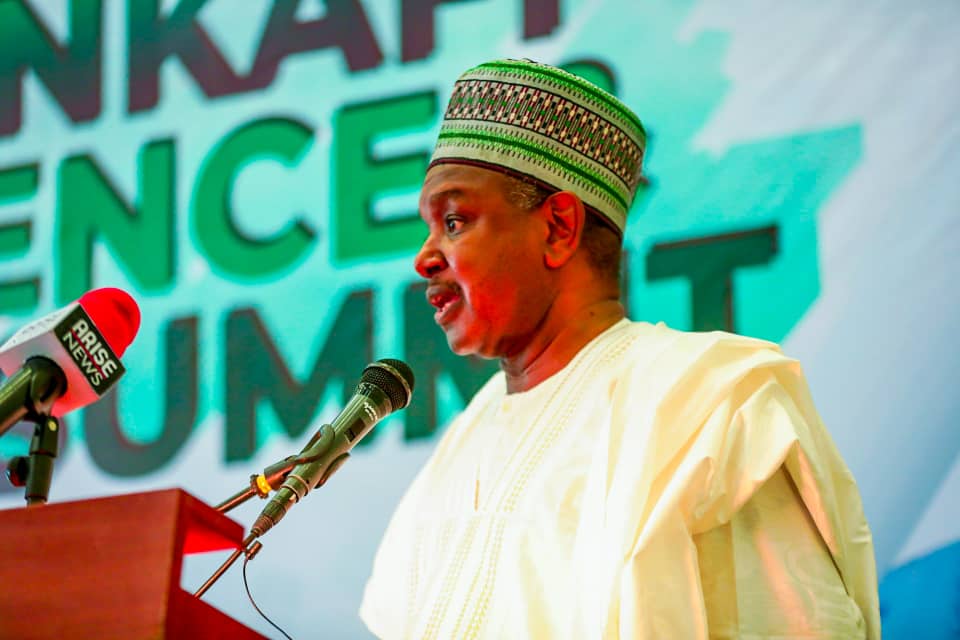
About The Author
Olubayo Paul
I'm a Strategic Communications Expert with over 9 years industry experience. I own unilagefiwe.com and olubayopaul.com; a widely published writer and a fluctuating Graphics Designer